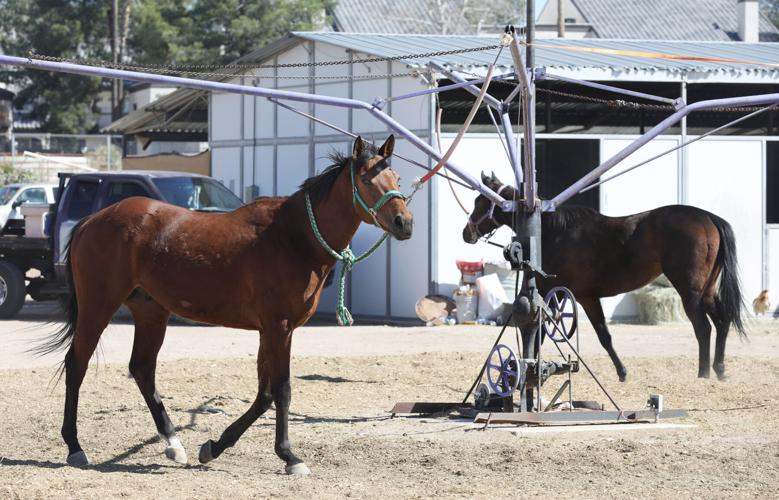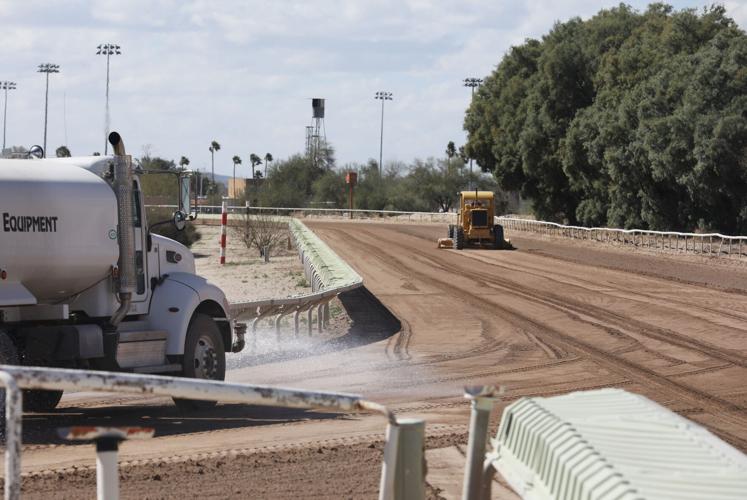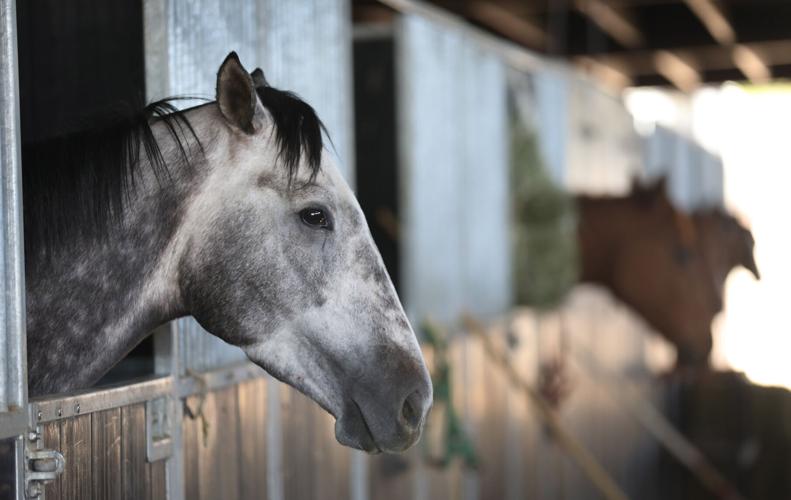Four race horses died during the opening weekend at Rillito Park Racetrack, prompting the creation of a panel of race-industry experts to review the cases and find ways to make racing here safer, officials say.
Jaye Wells, past president of the foundation that oversees track operations, said he will be joined on the panel by experts in and outside of the racing industry to "take a serious look at what Rillito can do to make it better."
Pima County has a contract with the Rillito Park Foundation, which includes Rillito Racing Inc., to operate the track through 2023. This season, 23 University of Arizona College of Agriculture and Life Sciences students are assisting Rillito officials with racetrack management, veterinary science, equine wellness, marketing, hospitality and retail. The six-week season runs annually from late February through early April.
Built in 1940, Rillito — located at 4502 N. First Ave. — has its place in horse racing history. It is hailed as the birthplace of quarter horse racing and was the first track to use photo finish. In 1988, the track was named a National Historical Landmark.
The track's current season of racing began last weekend. Wells was there, as was Arizona Racing Commission chairman and commissioner Rory Goreé.
Wells said that initially, it felt like old times following a nearly two-year layoff because of the pandemic.
"It was seamless and felt like we woke up from a bad dream," he said, "until the horses started dying."
Part of the problem, or the solution
The first horse that died Saturday was ridden by a jockey who'd never raced at the track before, Wells said. The quarter horse was running at high speed. The jockey tried to slow the horse down too soon, causing the animal to break down, Wells said.
"It might have been preventable, but it wasn't an egregious thing on the jockey's part and the horse shouldn't have broken down," Wells said. In horse sports, the term "break down" means the horse suffers a potentially career-ending injury, usually to its leg.
The second horse died after crashing with another horse. The two were running close together and kept bumping. The trailing jockey, longtime Rillito rider Jesus Osuna, swung wide to get out from behind another other horse and both animals went down; only one horse was injured.
Goreé said he walked out onto the track following both injuries — something he'd never done in the past — and was horrified by what he saw, saying he'll never be able to erase the injuries from his memory.
The third death occurred in Sunday's fourth race.
"For no apparent reason," Wells said of the injury. "There was no other horse near it. Its leg just snapped."

A grader and water truck prepare the track for this weekend’s races at Rillito Park Racetrack. More than $50,000 was spent on “surface readiness” prior to opening weekend, according to an official.
Wells called the weekend's fourth horse death "a freak accident," saying a horse in the paddock area reared up, lost its balance and fell backward, breaking its neck.
"I was very upset," Wells said. "I kind of forgot myself and went to everyone and told them we have to do something about it right away."
Wells said the foundation's board and track management remain in shock.
Pima County's acting administrator, Jan Lesher, said in an email to the Star that track "has assured us it has its own veterinarian at the track in addition to the state’s vet every race day, and that the track passed its Arizona Department of Gaming inspection prior to the start of racing this year.
"The county relies on the Foundation and the state of Arizona, which regulates horse racing and the proper care of horses, to ensure that all the animals involved in racing at our track are properly and humanely treated and cared for, and that there are proper safety standards for riders, staff and the public."
Lesher said the county will continue to work with the foundation to ensure safe and humane racing at the track.
Horse wellness program created
Rillito hadn't lost a horse since it created the nation's first equine wellness program.
The idea for the program began in 2017, when a change to the track's insurance required an executive to witness any horse being put down. Wells served as the witness to the first death.
"I said, 'Good lord, what am I doing?'" Wells said, recalling how right before the vet gave the horse the injection, the animal's owner — a young woman — came running over and fell onto the horse, crying as if she were losing a child.
"I thought, 'I either walk away from the problem or be a part of the solution,'" Wells added.
A few years later, the Rillito Park Equine Wellness Program was launched. It sets standards of care and monitoring that are now used at many tracks around the country, Wells said.
Under the program, a horse isn't allowed to enter a race unless a vet has examined it. University of Arizona student interns monitor the horses as they work out, writing down times, asking the riders if their horses feel sound and taking notes about all of it. Track officials then put the information that the interns gather into a database.
The data collected is key to preventing deaths, Wells said. While a small percentage of race horse deaths are caused by wrecks or sudden, devastating injuries, up to 80% are the result of previous injuries.
The first year of the program, in 2019, the track had zero horse deaths in 96 races. The previous year, there were five.
The program expanded in 2020 to administer Lasix, a drug used in horse racing to prevent respiratory bleeding in horses running at high speed. But that March, the season was abruptly halted due to the COVID-19 pandemic.
The 2021 season was canceled as well. With no races to host, track staff and employees with Pima County's Natural Resources, Parks and Recreation Department spent time fixing and improving the racetrack.
Wells said management did extensive work on the track to get it racing-ready after sitting idle for nearly two years.
Foundation president Ed Ackerley said in a statement that the foundation invested more than $50,000 in "surface readiness" prior to opening weekend, and the track's website touted a new parking lot, improved food and beverage service and live entertainment throughout meets.
"This is just the beginning"
The foundation has come up with two theories as to what went wrong last weekend.
The first has to do with the pandemic layoff. Last week marked the first races at Rillito in nearly two years. Race officials either had dated or no information about the competing horses. In essence, they were starting a new database.
"Whatever injuries might have been in (the horses') past, they haven't been here long enough to have been noticed," Wells said.
Many of the race horses here are "shippers," horses that live in outside stables as opposed to racetrack stalls.

Red Hot Kat awaits the second weekend of racing in a stall at Rillito Park Racetrack.
This year, the track quadrupled the purse money, with $100,000 in prize money up for grabs each day. The increased prize money has attracted entrants from California, Texas and Oklahoma.
Officials' second theory is that owners, drawn in by the money, are entering horses that don't belong in the races.
"We should be getting better horses, but we kind of suspect they're bringing out any horse they have to get some of that money," Wells said. "If that is the case, shame on us for not doing enough due diligence on those horses."
Under the current timeline, an owner could have entered their horse in one of the weekend's races last Wednesday, showed up to the track last Friday to get in their vet-monitored workout and raced on Sunday, Wells said.
"We feel we could have done better so far, but this is just the beginning of this," Wells said. "It broke my heart. I've been so proud of Rillito addressing these issues and then to have this."
"We're not trying to come up with excuses"
After witnessing the deaths last weekend, Goreé wrote a scathing op-ed criticizing the state of horse racing in Arizona.
Goreé blamed the situation on the 2017 lowering of the Regulatory Wage Assessment, which cost the department of gaming $1 million in funding and resulted in cutting of track and commission positions. The assessment is a set percentage that the department collects from bets placed on live and simulcast races at local tracks.
Prior to 2017, Goreé said, the commission had the ability to raise and lower the RWA based on budget and funding needs, but the percentage lowered and the number was fixed into law in 2017.
This means there is often nobody able to perform pre-race exams on all the horses. Further, the commission is unable to pay for staff to review racing records of all the horses entered to race and determine horses that are at risk, those that need more scrutiny or those that should be scratched.
Currently, he says, the state of Arizona lacks the ability to stop an at-risk horse from racing to its death.
"At this current pace, Arizona racing is facing a one- to two-year window until its demise unless we as a whole take immediate action," Goreé said, adding that he'd welcome a moratorium on racing until proper funding is enacted by the legislative bodies and better rules are put into place.
Other sports have taken on the same challenges.
A Formula One racing fan, Wells talked about how the sport took it upon itself to invest millions of dollars to make cars and tracks safer following high-profile deaths of drivers in the 1960s and 1970s.
"Now, if you hear about a racecar driver dying, you're shocked," Wells said. "The horse racing industry is not doing that. They're taking minimal steps."
Wells said there needs to be some real soul-searching in the industry to address the widespread problem of race horse deaths.
"What I've witnessed in the seven years I have been involved (with Rillito) is not hard cruelty of owners, but a love of these animals like they're pet dogs," Wells said. "On the whole, it's a very caring industry. But Rillito has suffered a severe instance of impact and if we don't react to it properly and can't find some other solutions, shame on us."
The Arizona Department of Gaming's Divisions of Racing is meeting next week and will conduct investigations into the deaths, and the foundation is working on getting to the bottom of the weekend's tragic events, Wells said.
"We're not trying to come up with excuses," Wells said. "We're looking for explanations."
Archive photos: Horse racing at Rillito Park
Horse racing at Rillito Park
Updated
Mud-covered jockeys at the Tucson Turf Club at Rillito Park on Feb. 12, 1968.
J. Rukin Jelks
Updated
J. Rukin Jelks' Rillito Track, about 1944.
Horse racing at Rillito Park
Updated
Snow across the Santa Catalina Mountains as the horses run at Rillito Park in January, 1960.
Horse racing at Rillito Park
Updated
Rillito Park in 1953.
Horse racing at Rillito Park
Updated
Horses racing at Rillito Park in Nov, 1953.
Horse racing at Rillito Park
Updated
Opening day cover treatment for a Tucson Citizen story on horse racing at Rillito Park, ca. 1950s.
Horse racing at Rillito Park
Updated
Undated photo of horses racing at Rillito Park.
Horse racing at Rillito Park
Updated
Undated photo of horses down the stretch at Rillito Park.
Horse racing at Rillito Park
Updated
Jockey Ron Beverly wipes mud from his face after a 350 yard quarter horse race on a very wet track in January, 1992.
Horse racing at Rillito Park
Updated
Horses and jockeys round the final turn at Rillito Park in November, 1988.
Horse racing at Rillito Park
Updated
Chariot races at Rillito Park in 1993, organized by Ty Cobb of Sierra Vista.
Horse racing at Rillito Park
Updated
A close race at the Rillito Downs in November, 1978.
Horse racing at Rillito Park
Updated
This 1978 photo shows the largest crowd in recent years, 3,210, attended opening day at Rillito Downs and saw several close races.
Horse racing at Rillito Park
Updated
Horses spring from the gate at the Tucson Turf Club at Rillito Park in March, 1968.
Horse racing at Rillito Park
Updated
Undated photo of horses at Rillito Park.
Horse racing at Rillito Park
Updated
Horse racing at Rillito Park in 1944, prior to the grandstands.
Horse racing at Rillito Park
Updated
Rillito Park Race Track sign in 1955.
Horse racing at Rillito Park
Updated
Grandstands at Rillito Park in 1955.
Horse racing at Rillito Park
Updated
Rillito Park in 1952.
Horse racing at Rillito Park
Updated
Undated photo of horses down the stretch at Rillito Park. Likely 1950s.







